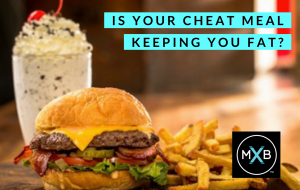
In my 20 years of working as a health and fitness professional, there have been two ubiquitous myths that have often left my clients confused and discouraged. Myth #1: “If I workout, I can eat whatever or however much I want.” And myth #2: “If I eat perfectly during the week, I can cheat on the weekend.” Due to the tremendous amount of contradicting information regarding the best workout/eating regimen to lose weight, these two myths can be very misleading. Yes, it’s true that when you workout you burn calories, which in turn facilitates weight loss. However, what most fail to understand is how the calories in/calories out theory actually works. Here are 5 ways you could be misusing the cheat meal and hindering your weight-loss efforts.
True weight-loss—which is the kind of weight-loss that lasts forever, not just temporarily—is accomplished on a weekly not daily basis. In order to lose 1 pound of fat, you have to burn an excess 3,500 calories a week. What does this mean? This means that if, for example, your average daily caloric intake is 2,500 calories, in order to lose 1 pound of fat you have to reduce your caloric intake to 2,000 a day for the entire 7 days of that week. If you reduce it to 1,500 calories per day, then you can lose 2 pounds in that week. If you are working out in addition to that, whatever calories you burn can help speed up weight-loss even more. If you follow this simple equation, it’s easy to understand how overconsuming calories for just one day can throw off an entire 5 days-worth of effort.
For example, the average restaurant meal is 2,000 calories. If you’ve had a perfect week of having reduced your caloric intake by 500 calories a day for 5 days, but then have an entire cheat day or even whole weekend, then you’re basically adding back the calories you worked so hard to reduce all week in a matter of minutes!
Yes, sometimes you really just crave that cheeseburger and fries—but does it have to be McDonald’s? We all know there are major differences between the quality of a burger in a fast food restaurant vs. a gourmet, grass-fed, real cheese (not processed) burger, but most fail to think about how your body is affected by this difference. If you’re maintaining a healthy, organic, whole foods diet during the week and then throwing in a wrench by consuming a meal full of bad carbs, junk oils and loads of sodium your well-running machine, i.e., your digestive system, will have a very difficult time breaking it down. And when your digestive system can’t break something down efficiently, it automatically stores it as FAT!
Again, keep in mind the calories in/calories out equation. A lot of people make the mistake of thinking if their consuming something “healthy” they can have as much of it as they want. Aside, from veggies, there is no healthy food that can be overconsumed and not have an effect on your weight-loss goals. I have often had clients confused by this reality thinking, “if it’s good for you, why can’t you eat a lot of it?” Well, because it’s still more calories or fat or carbs than your body can burn and when it can’t burn it, it stores it as FAT. Now, are you better off bingeing on quinoa vs. fries? 1,000% But just keep in mind, portion control ALWAYS matters!
Ideally, you want to eat your last meal of the day 3-4 hours before going to bed so that your body has time to digest most of it before you’re at rest and burning less calories. Even if your dinner is the healthiest it could be, protein and veggies and NO CARBS—PLEASE avoid carbs at night at all cost!—your body still needs to burn those calories and as soon as you lay down to rest, that calorie burn slows down, because your body goes into hibernation mode and does not need calories to burn energy, so those calories will get stored as FAT. It’s important to keep in mind that on the weekend your routine is usually thrown off and it’s more likely that not only will you go out to eat, but you’re also most likely eating later than normal.
Most people don’t know this, but alcohol has an enormous effect on your appetite and digestion. When alcohol is consumed it becomes the first fuel to be burned in your body. While that’s going on, your body will NOT burn fat. How does alcohol make you fat when it doesn’t have any fat in it? As alcohol enters into digestion, it is split into two compounds: fat and acetate. The fat is taken through your bloodstream and stored wherever you tend to store fat. The acetate is taken into the bloodstream and used as your primary energy fuel.
This means that rather than burning carbs, protein, or fat as a fuel your body relies on acetate for energy and completely stops burning anything else. So during your Saturday night cheat meal when you have a surplus of carbs, protein, and fat circulating in your body they will have nowhere to go. So where does it all end up? You guessed it! It’s stored as fat in your waistline, hips, thighs—the worst places!
But that’s not the only effect. Alcohol also acts as a potent appetizer.
Have you ever heard of an apéritif? Having an apéritif is a French custom; it’s an alcoholic drink taken before a meal in order to increase your appetite. Basically any alcoholic beverage increases your appetite and of course restaurants know this is a great way to get you to order more food, this is why they offer you wine before dinner! Moreover, many studies have shown there is a dramatic increase in caloric intake when you consume an alcoholic beverage before a meal.
Weight-loss is a simple mathematical equation: calories in – calories out = weight-loss. For some of you foodies, looking forward to your decadent cheat meal might be what gets you through your workouts, your hectic week, even your life period! However, being a little mindful of how you implement this meal into your week, can have an incredible effect on your weight-loss goals!
Disclaimer
Although my blog topics can be very beneficial to your overall health, they are not intended for the purpose of providing medical advice. All content is for informational purposes only and is not intended to serve as a substitute for the consultation, diagnosis, and/or medical treatment of a qualified physician or healthcare provider. Every effort is made to ensure the accuracy of published information on or through my website, blog, e-mails, programs and services. However, the information may inadvertently contain inaccuracies or typographical errors. Every effort has been made to present you with the most accurate, up-to-date information, but because the nature of diet, fitness and health research is constantly evolving, we cannot be held responsible for the accuracy of our content.




Are you confused by all the conflicting diet and fitness information? Do you feel overwhelmed by what you should be doing to have optimal health? Then you’ve come to the right place!
Follow me and let me help you make sense of all of this!
